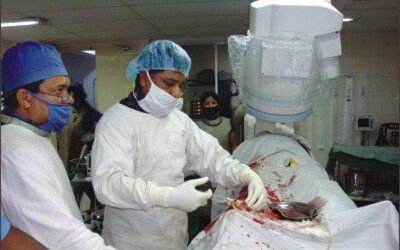When most of these hospitals are struggling to cope with poor settings dealing with the rising number of patients, Mitford Hospital makes a difference in cardiac care with their highly skilled cardiac team and well planned cardiac set up. Thus it is flourishing the image of government sector seeing more patients with cardiac ailments.
The department is serving more people these days with improved and advanced treatment options. The department had been pioneering radial angiogram (an improved method of angiogram through the artery of hands instead of legs) at regular basis for long time before many government and high tech private hospitals in Bangladesh.
Different types of challenging angiogram and angioplasty are being performed as regular basis here. Along with other cardiac services, the department has been performing on an average 5 angiograms every day. Recently, the department has performed primary PCI (Percutaneous Coronary Intervention) which is very useful and improved method to treat myocardial infraction or heart attack and to prevent other life threatening complications.
The cardiac team is lead by renowned interventional cardiologist Prof Dr Md Afzaur Rahman, who is very famous for his brilliant works in the country and abroad. Prof Rahman, who has recently been selected as the international faculty member of Transcatheter Cardiovascular Therapeutics (TCT 2009 Conference) in the USA said that heart attacks are serious, but they need not be deadly. By ensuring early hospitalisation and prompt treatment, we can save the valuable lives and significantly reduce the number of mortality and morbidity. We need to ensure the lifesaving measures in all hospitals to reduce the unnecessary death and disability.
“Learning is another important thing that needs to be delivered to the people. We have to focus more on prevention strategy in the context of poor settings of a country like Bangladesh. The increase in coronary risk are more environmental than genetic, and can significantly be lessened by simple medications, changing our the lifestyle like eating habits and regular exercise. We are doing better in cardiac care but still have to do a lot more for prevention and treatment”, he added.
Although the cardiology department of Mitford Hospital signals that they are ready to give improved and latest medical treatment to all type of people, the hospital can not provide full fledge cardiac services due to the lack of cardiac surgery department. Since both cardiology and cardiac surgery are inter-related, they can not give proper services to people who need more surgical than medical treatment.
Often patient admitted here whose ultimate treatment is surgery, need to seek the final treatment facilities at some other institutions like NICVD or other private hospitals. If the cardiac surgery department is established here, more people with surgical need can be served at the same setting more conveniently.
There is only one full-fledged government cardiac specialised center — the National Institution of Cardiovascular Diseases (NICVD) for the entire population in Bangladesh. Apparently a single center is quiet insufficient in comparison to the need of whole people, especially for the poor and marginalised patients who cannot afford private healthcare.
We need to expand the cardiac care and set up more centers to serve large number of population. The tertiary centers like medical college hospitals can lessen the burden and effectively serve huge number of patients. If these centers can provide their services in the full range more patients can access healthcare in government setting. Private healthcare sectors in cardiac care are already booming, but the sky scraper medical expense make them unavailable for the poor.
Treatments of cardiovascular diseases are considered costly. But the disease can affect anyone irrespective of poor and rich. There is a need for increased government investment through national programmes aimed at prevention, control and improving treatment of cardiovascular diseases.
Source: The Daily Star, October 03, 2009





 Mom’s obesity tied to daughters’ early puberty
Mom’s obesity tied to daughters’ early puberty
Leave a Reply